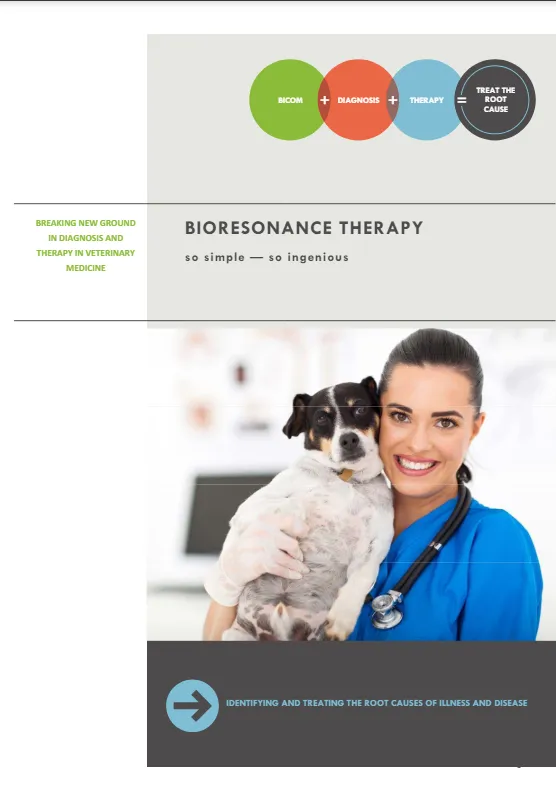BICOM® Bioresonance
Stress-free for pets and pet owners Suitable for all types of animals
There are many dogs , cats and horses suffering from health problems worldwide.
Be it problems with the musculoskeletal system, allergies and food intolerances or chronic diseases.
Sometimes, as an animal owner, you are at a loss when you can’t get any further with conventional therapy methods.
Like acupuncture or homeopathy, bioresonance belongs to the field of complementary medicine and is intended to be a useful supplement to conventional medicine.
It works with the body’s own wavelength of the four-legged friend, is used without medication and is painless to use.
Of course, not all health problems can be resolved with bioresonance. It is best to talk to a veterinarian or animal naturopath.
With our therapist finder you can find the nearest practice that can offer you BICOM® bioresonance.
Pain-free testing and therapy
Treatment with the BICOM® device is painless and stress-free. Especially sensitive animals feel very comfortable and it often happens that they completely relax and come to rest during the therapy.
Bioresonance has no harmful side effects and is used without medication.
Occasionally, initial aggravations, in what is known as the body’s initial reaction, can occur. However, these fade away after a short time.
What Pet Owners are saying..

Best Specialist Dog Vet: Expert Care for Your Pet’s Longevity
Why a Specialist Dog Vet Could Be the Key to Your Dog’s Longevity
When it comes to the well-being of our furry companions, we all want to ensure they live long, happy, and healthy lives. While regular check-ups at your local dog vet are essential for maintaining your dog's health, sometimes general care is just not enough. This is where a specialist can make a world of difference in your pet's longevity and overall well-being.
In this post, we’ll explore the importance of specialized veterinary care and why consulting an expert who focuses on specific health concerns could be crucial for your dog’s long-term health.
What Is a Specialist Dog Vet and Why Does It Matter?
A specialist dog vet is a veterinarian who has advanced training and experience in a specific area of veterinary medicine. While general vets are well-versed in common health issues, specialists focus on a particular field, such as cardiology, dermatology, orthopedics, neurology, or oncology. These specialists undergo extensive training beyond the standard vet qualifications, often requiring years of study and practical experience.
This specialized knowledge allows them to provide a higher level of care for specific health conditions and treatments. While your general vet for pets may be equipped to handle routine check-ups and basic medical concerns, a veterinary specialist for dogs has the expertise to tackle more complex, specialized health issues that can significantly impact your dog’s longevity.
When to Consult a Specialist Dog Vet?
Knowing when to consult a veterinary specialist for dogs is key to ensuring your dog receives the best care. Here are some signs that it might be time to seek the expertise of a specialist:
Chronic Health Conditions
If your dog has been diagnosed with a chronic illness like diabetes, arthritis, or heart disease, a specialist can help manage the condition and provide targeted treatments that may improve your pet’s quality of life.Unresolved or Complicated Health Issues
If your dog is experiencing symptoms that are not improving with standard treatments, it may be time to consult a specialist. Conditions such as severe allergies, unusual behavioral changes, or persistent pain may require advanced diagnostic tools and treatment options that specialists offer.Specialized Surgery
If your dog requires surgery beyond routine procedures, such as advanced orthopedic surgery or a specialized heart operation, a veterinary specialist for a dog who specializes in surgery will be able to perform these high-risk procedures with the expertise required to ensure your dog’s success.Age-Related Health Concerns
Older dogs face unique challenges as they age. Specialized care can help address issues like arthritis, dental diseases, and cognitive dysfunction, which are common in senior dogs. A specialist can tailor treatments specifically for aging dogs to help them live their best lives in their golden years.
The Benefits of Consulting a Veterinary Specialist For Dogs
Let’s break down the key advantages of seeing a specialist for your dog:
1. Advanced Knowledge and Skills
Specialist vets are experts in their field. Their advanced knowledge and skills allow them to diagnose and treat health issues that are outside the scope of a general vet’s practice. For example, a cardiologist can identify and treat heart conditions in dogs that might go unnoticed by a general vet for pets. With access to specialized equipment, such as advanced imaging techniques and laboratory testing, specialists can provide more accurate diagnoses and targeted treatment plans.
2. Targeted Treatments
One of the greatest advantages of a veterinary specialist for dogs is their ability to provide tailored, effective treatments. For example, if your dog has cancer, an oncologist will be able to offer the most up-to-date treatments available, such as chemotherapy or radiation, to improve your dog’s chances of remission or recovery. Similarly, a dermatologist can help manage skin conditions like eczema or hot spots that require specialized treatments that a general vet may not be as familiar with.
3. Better Outcomes for Complex Cases
Dogs with complicated health issues often have a better chance of recovery when treated by specialists. Whether your dog is dealing with a neurological disorder, orthopedic problem, or other chronic illness, a specialist will be able to provide the necessary care and management to improve outcomes. They may even recommend clinical trials or experimental treatments that could help your dog live a longer, healthier life.
4. Faster Diagnoses and Solutions
When your dog is sick or in pain, time is of the essence. A veterinary specialist for dogs can provide faster diagnoses and quicker treatment options. With their specialized knowledge and experience, they are more likely to identify and treat the problem promptly, which could lead to a better prognosis and a quicker recovery.
5. Personalized Care Plans for Your Dog’s Needs
Specialist vets understand that every pet is unique. They work with you to create a personalized care plan that fits your dog’s specific needs, ensuring the most effective treatments and lifestyle adjustments. This personalized approach allows you to make informed decisions about your pet’s health, improving their overall well-being.
Specialized Fields of Dog Veterinary Care
Here are some of the most common types of specialists in veterinary care that can contribute to your dog’s longevity:
1. Veterinary Cardiology
A veterinary cardiologist specializes in heart-related issues. Dogs with heart disease often require specific care, including medications, diet modifications, and possibly surgery. Specialist cardiologists can provide the most accurate diagnostic tools, such as electrocardiograms (ECGs) and echocardiograms, to monitor your dog’s heart health.
2. Veterinary Orthopedics
Specialists in orthopedics focus on bone, joint, and muscle problems. If your dog is experiencing issues such as hip dysplasia, arthritis, or fractures, an orthopedic vet can offer treatments like surgery, physical therapy, or medication to improve mobility and comfort.
3. Veterinary Neurology
If your dog is suffering from neurological conditions such as seizures, spinal disorders, or brain tumors, a veterinary neurologist can help. They can provide treatments such as surgery, medication, or rehabilitation to manage and treat these complex conditions.
4. Veterinary Oncology
Veterinary oncologists specialize in cancer treatment for pets. Cancer can be devastating for dogs, but early detection and specialized treatments can improve outcomes. Oncologists offer targeted therapies like chemotherapy, radiation, or immunotherapy to treat cancer in pets.
5. Veterinary Dermatology
Dogs with persistent skin issues, such as allergies, infections, or autoimmune diseases, can benefit from a veterinary dermatologist. These specialists have a deeper understanding of skin conditions and can provide treatments like immunotherapy, topical medications, or allergy management to improve your dog’s skin health.
When to Seek a Specialist Dog Vet?
If you notice any of the following signs in your dog, it may be time to consult a veterinary specialist for dogs:
Persistent symptoms that don’t respond to general treatment
Complex or chronic health conditions
Special surgeries or procedures
Your dog is aging and requires specialized care
You need more in-depth understanding of a specific health concern
Consulting a specialist is an investment in your dog’s health and longevity. Early intervention and expert care can make a significant difference in your pet’s quality of life.
Conclusion
If you're considering a dog vet specialist, don't wait any longer. Their specialized knowledge and expertise can make all the difference in diagnosing and treating complex health issues, ensuring your dog’s well-being. Reach out to a trusted veterinary practice today to provide your dog with the best care possible.
Whether you're looking for a vet for pets to address ongoing health concerns or simply want to ensure your dog's longevity, specialized care is key. Contact us now to book an appointment and take the first step toward a healthier, longer life for your furry companion.
To find a vet near you please complete the form below
Quick Links








Facebook
Instagram
Mail